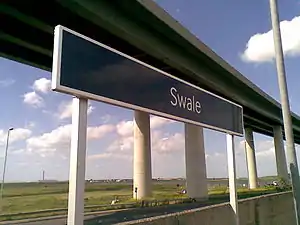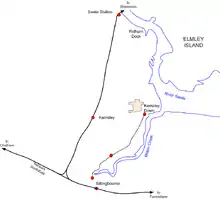Swale railway station
Swale railway station is in north Kent, England, on the Sheerness Line 47 miles 15 chains (75.9 km) from London Victoria, at the southern end of the Kingsferry Bridge which, along with the more modern Sheppey Crossing, connects the Isle of Sheppey to mainland Kent. The nearest settlement is Iwade. Train services are provided by Southeastern.
 Swale Station with the Sheppey Crossing in the background | |
| Location | Kingsferry Bridge, Iwade, Swale England |
| Grid reference | TQ912691 |
| Managed by | Southeastern |
| Platforms | 1 |
| Other information | |
| Station code | SWL |
| Classification | DfT category F2 |
| Key dates | |
| 25 November 1913[1] | Staff halt opened as Kings Ferry Bridge Halt |
| December 1922 | Opened to passengers as Kings Ferry Bridge South Halt |
| 1 November 1923 | Renamed Kings Ferry Bridge Halt |
| 1929 | Renamed Swale Halt |
| 20 April 1960 | New station opened |
| Passengers | |
| 2015/16 | |
| 2016/17 | |
| 2017/18 | |
| 2018/19 | |
| 2019/20 | |
| Notes | |
Passenger statistics from the Office of Rail and Road | |
Facilities

Swale is a single platform station with one curving platform. It is immediately adjacent to the A249 road which is on a flyover above the station before it crosses The Swale on the Sheppey Crossing. The station is named after The Swale, the channel which separates the Isle of Sheppey from the mainland and connects with the River Medway to the west and Thames Estuary to the west. North of the station, the railway line crosses the channel on the Kingsferry Bridge. Ridham Dock lies 1 mile (1.6 km) south-east of the station.
History
The station was opened in 1913 as a staff halt, called Kings Ferry Bridge Halt.[3] On 17 December 1922, the Norwegian cargo ship Gyp collided with the Kingsferry Bridge,[4] rendering it unfit for rail traffic, and the station was renamed Kings Ferry Bridge South Halt, and opened to the public, who were able to walk across the bridge to a temporary station at Kings Ferry Bridge North Halt to continue their journeys.
This arrangement continued until 1 November 1923, when the bridge reopened to traffic and the North halt closed. The station was renamed Kings Ferry Bridge Halt on this date. The name was changed to Swale Halt in 1929. With the building of the new Kingsferry Bridge in 1960, a new station was constructed, opening on 20 April 1960.[3] The station is the nearest to Ridham Dock and was built by British Railways.
In 2005 the idea of closing Swale station, or at least replacing its train service with a token service (e.g. one train a week in either direction), was proposed by the Strategic Rail Authority (SRA)[5] but rejected.
Services
The typical off-peak service from the station is two trains per hour to Sheerness-on-Sea and two trains per hour to Sittingbourne, for connections to London.
There is also one very early morning train towards Sheerness-on-Sea that starts from Gillingham. This service uses the Western Junction to connect to the Sheerness Line from the Chatham Main Line. As a result, this service does not stop at Sittingbourne.
| Preceding station | Following station | |||
|---|---|---|---|---|
| Kemsley | Southeastern Sheerness Line |
Queenborough | ||
References
- Private and Untimetabled Railway Stations by G.Croughton
- "A Kent railway station has just ELEVEN passengers a day". Kent Live. 16 December 2016. Archived from the original on 17 December 2016. Retrieved 28 December 2016.
- Kidner, p. 56.
- "King's Ferry Bridge seriously damaged". The Times (43217). London. 18 December 1922. col A, p. 9.
- "Kent franchise sees service plans revised". Modern Railways. London: Ian Allan. February 2005. p. 5.
- Kidner, R. W. (1985). Southern Railway Halts. Survey and Gazetteer. Headington, Oxford: The Oakwood Press. ISBN 0-85361-321-4.
| Wikimedia Commons has media related to Swale railway station. |